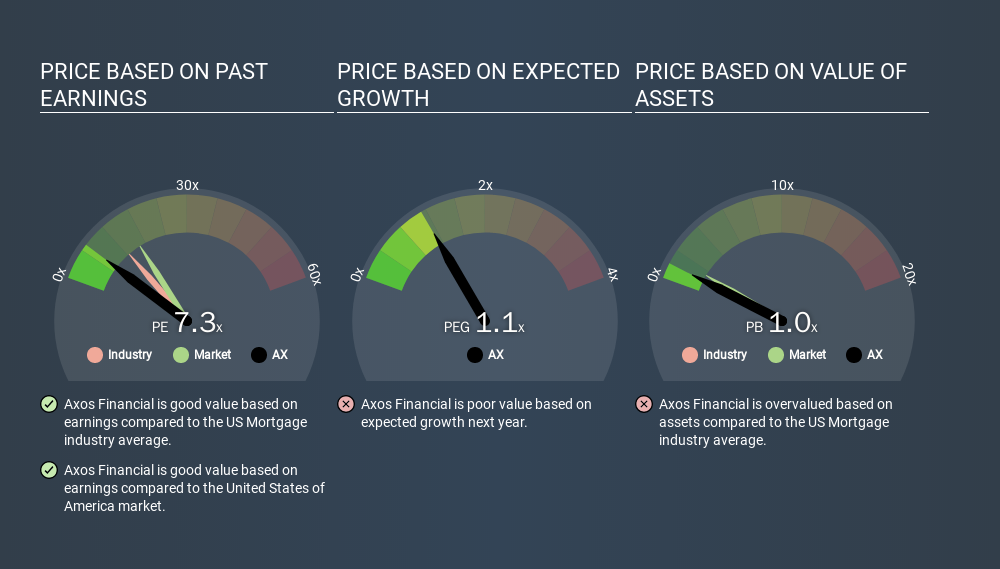- United States
- /
- Banks
- /
- NYSE:AX
A Sliding Share Price Has Us Looking At Axos Financial, Inc.'s (NYSE:AX) P/E Ratio

Unfortunately for some shareholders, the Axos Financial (NYSE:AX) share price has dived 32% in the last thirty days. That drop has capped off a tough year for shareholders, with the share price down 36% in that time.
All else being equal, a share price drop should make a stock more attractive to potential investors. While the market sentiment towards a stock is very changeable, in the long run, the share price will tend to move in the same direction as earnings per share. The implication here is that long term investors have an opportunity when expectations of a company are too low. Perhaps the simplest way to get a read on investors' expectations of a business is to look at its Price to Earnings Ratio (PE Ratio). Investors have optimistic expectations of companies with higher P/E ratios, compared to companies with lower P/E ratios.
View our latest analysis for Axos Financial
Does Axos Financial Have A Relatively High Or Low P/E For Its Industry?
Axos Financial's P/E of 7.34 indicates relatively low sentiment towards the stock. The image below shows that Axos Financial has a lower P/E than the average (12.1) P/E for companies in the mortgage industry.

Axos Financial's P/E tells us that market participants think it will not fare as well as its peers in the same industry. While current expectations are low, the stock could be undervalued if the situation is better than the market assumes. It is arguably worth checking if insiders are buying shares, because that might imply they believe the stock is undervalued.
How Growth Rates Impact P/E Ratios
P/E ratios primarily reflect market expectations around earnings growth rates. Earnings growth means that in the future the 'E' will be higher. That means unless the share price increases, the P/E will reduce in a few years. A lower P/E should indicate the stock is cheap relative to others -- and that may attract buyers.
Axos Financial's earnings per share were pretty steady over the last year. But over the longer term (5 years) earnings per share have increased by 18%.
Don't Forget: The P/E Does Not Account For Debt or Bank Deposits
It's important to note that the P/E ratio considers the market capitalization, not the enterprise value. In other words, it does not consider any debt or cash that the company may have on the balance sheet. Theoretically, a business can improve its earnings (and produce a lower P/E in the future) by investing in growth. That means taking on debt (or spending its cash).
Such spending might be good or bad, overall, but the key point here is that you need to look at debt to understand the P/E ratio in context.
Is Debt Impacting Axos Financial's P/E?
With net cash of US$250m, Axos Financial has a very strong balance sheet, which may be important for its business. Having said that, at 21% of its market capitalization the cash hoard would contribute towards a higher P/E ratio.
The Bottom Line On Axos Financial's P/E Ratio
Axos Financial's P/E is 7.3 which is below average (15.1) in the US market. EPS was up modestly better over the last twelve months. And the healthy balance sheet means the company can sustain growth while the P/E suggests shareholders don't think it will. Since analysts are predicting growth will continue, one might expect to see a higher P/E so it may be worth looking closer. What can be absolutely certain is that the market has become more pessimistic about Axos Financial over the last month, with the P/E ratio falling from 10.8 back then to 7.3 today. For those who prefer to invest with the flow of momentum, that might be a bad sign, but for deep value investors this stock might justify some research.
When the market is wrong about a stock, it gives savvy investors an opportunity. If the reality for a company is not as bad as the P/E ratio indicates, then the share price should increase as the market realizes this. So this free visual report on analyst forecasts could hold the key to an excellent investment decision.
But note: Axos Financial may not be the best stock to buy. So take a peek at this free list of interesting companies with strong recent earnings growth (and a P/E ratio below 20).
If you spot an error that warrants correction, please contact the editor at editorial-team@simplywallst.com. This article by Simply Wall St is general in nature. It does not constitute a recommendation to buy or sell any stock, and does not take account of your objectives, or your financial situation. Simply Wall St has no position in the stocks mentioned.
We aim to bring you long-term focused research analysis driven by fundamental data. Note that our analysis may not factor in the latest price-sensitive company announcements or qualitative material. Thank you for reading.
About NYSE:AX
Axos Financial
Provides consumer and business banking products in the United States.
Flawless balance sheet and undervalued.
Similar Companies
Market Insights
Community Narratives



